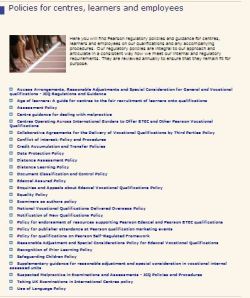Learning Outcome 1 – Understand the principles and practices of assessment
1.4 Identify the regulations and requirements relevant to the assessment in own area of practice
Our policies for management of assessment evidence eg portfolios, assessment records, observation records, physical evidence, learner and witness statements; management of assessment records, are all in accordance with the Data Protection Act (2003).
We use the Act’s mandatory guidelines to help us protect the personal data we hold and/ or process.
All work and information is processed fairly and lawfully and obtained and used only for specified and lawful purposes. It is made clear to the students that we only keep adequate, relevant and not excessive information so as to keep accurate information that provides an up to date record that we do not keep for longer than necessary.
All assessment information is processed in accordance with the individual’s rights and kept secure with the admin team who, all the while, provide learners with the opportunity to request to see the information public authorities hold about them in line with the
Freedom of information act (2000)
Our storage and retrieval of information is password protected when online/ digital, and under lock and key when physical. The confidentiality of the data is paramount and our use of technology to share information with relevant parties eg learners, other assessors, employer, colleagues, organisation must abide by our protocol before it is considered.
The college follows regulations covering sharing of assessment/ personal information following Ofqual’s lead as we protect the interests of learners and promoting ‘public confidence in the national qualifications system’ (Ofqual, 2008, p3) through our thorough and rigorous approach to safeguarding information.
By following these procedures the college follows the recognised standards for the Regulatory arrangements for the Qualifications and Credit framework (2008), Health and safety at work (1974), and the Equality Act (2010) to help its own reputation as a good/ outstanding awarding organisation.
This in turn helps the organisations vocational links to the SSC sector skills council and its industry standards of data protection while also increasing the skills and productivity of our respective sectors workforce under safe, professional circumstances. These guidelines provider us with influence as to how we can better development our own qualifications and apprenticeships.
Edexcel is our primary awarding organisation so their policies and guidelines are arguably the most regularly used every day.
This page provides me with clear guidelines on numerous issues relating to the course and assessment when I need it.
For example, the Assessment Policy instructs the following as necessary elements of the Assessment Design so that it be credible and valued:
The Edexcel five requirements of assessment are Reliability, Validity, Comparability, Manageability, and Minimising of bias.
The emphasis on the transparency of approach, peer review and encouragement to use technology is very useful and something i defer to when struggling to compose a new Assignment.

Thank you Scott very helpful information.
You are very welcome.
Hi Scott, firstly thank you so much for putting all this up!!! It’s an invaluable resource!
I hope you don’t mind me asking for a bit more information on this one though. I notice you replied to someone yesterday so I’m hoping I’ll catch you whilst you’re still around!
When you discuss the Data Protection Act above, is that an example you’re giving based on your role as a Lecturer of Creative Arts & Technologies? Or is that one everyone will use as an assessor as should therefore be used on all responses?
Thanks again!
Hi Daryl,
Regarding the Data Protection Act the example I’m giving is based on my role as a Lecturer of Creative Arts & Technologies – although I feel it is pretty transferable to other disciplines.
Be sure to relate an example from your particular practice as illustration of how you will apply an understanding of the DPA and you will be fine.
Hope that helps.
Scott